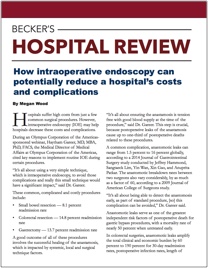Studies show the best time to detect
a leak is when you’re still in the OR
a leak is when you’re still in the OR
Anastomotic leaks have
devastating implications:
devastating implications:
- Doubles length of hospital stay3 and increases cost of $28,600 per patient on average2
- Significantly greater chances of wound infection and increased mortality rates of up to 32%2
Intra-Operative Endoscopy (IOE)
supports better clinical outcomes4:
supports better clinical outcomes4:
- Allowed the reduction of potential leak rate by 91.8% compared to no testing4
- Reduced anastomosis related morbidity from the expected 3.2% to 1.3%4
Download the Beckers report on “How intra-operative endoscopy can potentially reduce a hospital’s costs and complications”
 DOWNLOAD THE REPORT
DOWNLOAD THE REPORT
Clinical References:
1. Hammond, J., Lim, S., Wan, Y., Gao, X., & Patkar, A. (2014). Journal of Gastrointestinal Surgery, 18(6), 1176-1185.
2. Zhao Y, Encinosa W. The Costs of End-of-Life Hospitalizations, 2007: Statistical Brief #81. www.hcup-us.ahrq.gov.
3. Britton, Julian, 5 Gastrointestinal tract and abdomen, 29 Intestinal anastomosis, ACS Surgery, Dale DC; Federman DD, Eds, New York 2000.
4. Haddad A, Tapazoglou N, Singh K, Averbach A. Role of Intra-Operative Esophagogastroenteroscopy in Minimizing Gastrojejunostomy-Related Morbidity: Experience with 2,311 Laparoscopic Gastric Bypasses with Linear Stapler Anastomosis. Obesity Surgery. 2012;22(12):1928-1933
1. Hammond, J., Lim, S., Wan, Y., Gao, X., & Patkar, A. (2014). Journal of Gastrointestinal Surgery, 18(6), 1176-1185.
2. Zhao Y, Encinosa W. The Costs of End-of-Life Hospitalizations, 2007: Statistical Brief #81. www.hcup-us.ahrq.gov.
3. Britton, Julian, 5 Gastrointestinal tract and abdomen, 29 Intestinal anastomosis, ACS Surgery, Dale DC; Federman DD, Eds, New York 2000.
4. Haddad A, Tapazoglou N, Singh K, Averbach A. Role of Intra-Operative Esophagogastroenteroscopy in Minimizing Gastrojejunostomy-Related Morbidity: Experience with 2,311 Laparoscopic Gastric Bypasses with Linear Stapler Anastomosis. Obesity Surgery. 2012;22(12):1928-1933






















